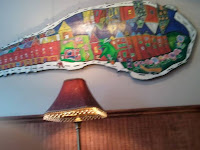
The name Appalachian comes from the Appalachee Indians. Appalachia is in the southeastern United States, which is located in North America. It is also the second largest mountain system of North America. Most students at Ohio University don’t know they live in Appalachia; they spend four or more years in Athens not knowing the culture around them. Appalachian people are considered a separate culture, made up of many unique backgrounds such as Native American, Irish, English and Scotch, all blended together across the region. The mountains also figure into the uniqueness of Appalachia. When we think of Appalachia we think of the mountains and not the people within the culture, Appalachian people are independent, nature bound, family oriented people. Appalachian culture is also reveled through its arts and crafts, traditional music, traditional foods, and its customs and traditions. After learning about Appalachia and its culture we interviewed three students from Ohio University to see what they knew about Appalachia.
Student # 1
Erin Eberhart Freshman at Ohio University (Alex's Friend)
 What does living in Appalachia mean to you?
What does living in Appalachia mean to you?"I wasn't aware I was living in Appalachia. What is that? I guess it doesn't really mean much".
Do you consider yourself Appalachian?
"Nope"
Should there be more interaction/connection/communication between the university and the surrounding area?
"I don't know, but maybe we should be more educated in knowing what Appalachia is".
Student #2
Erin Harlow Freshman at Ohio University (Madison's Friend)
 What does living in Appalachia mean to you?
What does living in Appalachia mean to you?"Hills in Ohio and some other states close to us like the Virgina's".
Do you consider yourself Appalachian?
"No, cbus is flat. But Athens is Appalachia I think".
Should there be more interaction/connection/communication between the university and the surrounding area? "Nah"
Student #3
Alexis Meyers Freshman at Ohio University (Madison's Friend)
 What does living in Appalachia mean to you?
What does living in Appalachia mean to you?"I have no idea"
Do you consider yourself Appalachian?
"I don't even know what that means so no".
Should there be more interaction/connection/communication between the university and the surrounding area?
"Sure"
 It is so important to know where you come from and where you live. I have heard that if you don't know where you have been then how is it you can know where you are going? It is interesting to go around and see what people think about what it means to live in Appalachia. There were a wide variety of answers to the questions that I asked. Here are the interviews...
It is so important to know where you come from and where you live. I have heard that if you don't know where you have been then how is it you can know where you are going? It is interesting to go around and see what people think about what it means to live in Appalachia. There were a wide variety of answers to the questions that I asked. Here are the interviews...

































